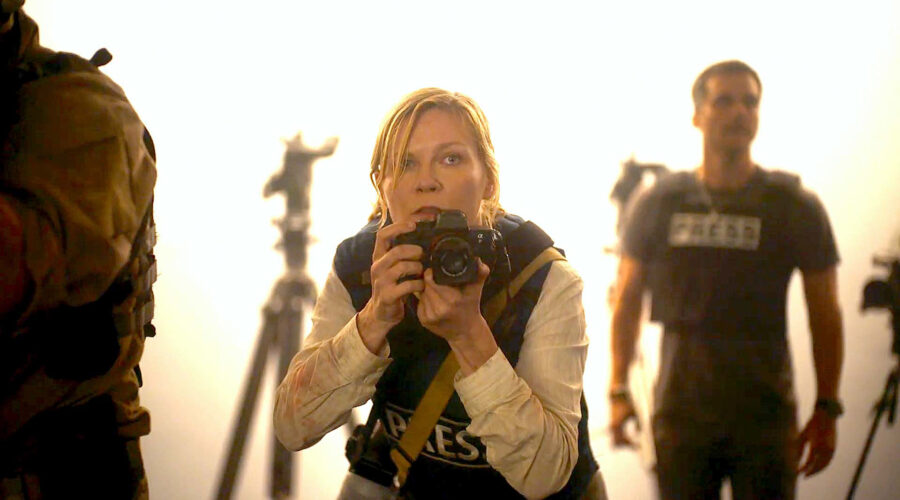During the assault on The White House in the riveting climax to Alex Garland’s Civil War, soldiers fight in the narrow corridors of America’s sullied power. Automatic fire resonates and echoes as ex-presidents look on, too helpless to intervene, trapped by their portraits and constraints of a constitution they obeyed but others set ablaze, those 21st century reincarnations of Girolamo Savanarola, torching the luxury of democracy and the freedom of the press in a bonfire of the vanities.
As the soldiers open fire and are fired upon, journalists buzz in and out of cover, bullets spraying plaster and brick, near misses, payback for magazine covers and social media images capturing the violent demise of other human beings during conflict. The soldiers manhandle the press, shove them behind walls, pull them by their flak jackets to safety, effectively fighting with one hand behind their backs as embedded journalists may be fired upon legally by opposing forces according to the Geneva Conventions of 1949.
The soldiers don’t mind the extra baggage. They want the incumbent president dead as Dillinger, they know the power of the image, Iwo Jima, the fall of Saigon, the Twin Towers. The president has disbanded the FBI, ordered air strikes on Americans and is in power for a third term.
Civil War might be dystopian fiction but during its release we have seen Max Azzarello burn himself to death after brandishing a sign telling us, “TRUMP IS WITH BIDEN AND THEY’RE ABOUT TO FASCIST COUP US” and the former president and Republican candidate facing multiple charges in a hush-money case before he reckons with his major political crimes.
Is this what America really wants to see? A dead president? Republican or Democrat, the colour doesn’t seem to matter if the POTUS is hog-tied across the hood of their motorcade for all to see.
America hasn’t had a Zapruder film since 1963 and withdrawal symptoms seem to have sent the country shivering for presidential blood.
It’s apt that Alex Garland, the English screenwriter of the Dredd movie, brought up on the cynical, smart, subversive, comic strips of 2000AD is the person to tap into the current zeitgeist, and Civil War could be ripped from the those early, prescient 2000AD progs, a Dredd prequal of sorts. After all, in Dredd lore, President Booth rigged the election, murdered an aide who was about to implicate him, started a nuclear war and was deposed by unelected judges who dismantled democracy permanently.
Lest we forget Trump’s plan for his next term, God forbid he wins, is to further dismantle the checks and balances of power and overturn military aid to Ukraine, effectively giving Putin carte blanche to expand further into Eastern Europe. Bill Barr, Trump’s former attorney general recently suggested that Trump used to float the idea of executing his political rivals when he was in office. Garland keeps the exact details of the start of his Civil War vague, trusting his audience and their intelligence to infer what they will, but he is clear that a strongman, populist president has lit the touch paper.
We see the president in the first shot, out of focus, media savvy, practicing his speech, Trumpian in tone, Clintonian in dialect, promising, “The greatest victory in the history of mankind.” Nick Offerman’s president has the uncanny knack of appearing like many recent presidents at once, much like Martin Sheen’s chilling turn as presidential hopeful Greg Stillson in The Dead Zone, part Richard Nixon, part JFK. The quartet of journalists, led by the 1000-yard-stare veteran Lee Smith (Kirsten Dunst at her cold best), her gonzo writing partner Joel (Wagner Moura), Lee’s old mentor Sammy (Stephen McKinley Henderson), and rookie Jessie (Cailee Spaney) want an interview, the first in fourteen months; thus begins an odyssey across the 857 miles to DC.
Arguably the greatest high-end genre film director working today, Garland gives us no easy answers about the state of America, the state of journalism, or the state of the modern human condition. He trusts his audience to deliver the nuance to his bravura cinematic choices. The De La Soul needle drop in the middle of a fire fight and subsequent executions is as jarring as Surfin’ Bird by the Trashmen in Full Metal Jacket, and Jesse Plemons’ horrifying cameo is as memorable as Robert Duvall’s Colonel Kilgore in Apocalypse Now.
A simple flash of adrenaline-filled elation between Joel and Jessie in the heat of battle perfectly captures the addiction and morbid attraction to combat journalism. Another shot of Joel screaming or Lee shaking highlights the price they pay for us to doom scroll through their egotistical endeavours to bring us a version of the truth.
As Lee says to Jessie after witnessing the horrors of civil war, “Once you start asking those questions you can’t stop. So we don’t ask. We record so other people ask.”
Civil War will make those people ask countless questions as America braces itself for the most significant election perhaps in its entire history.

